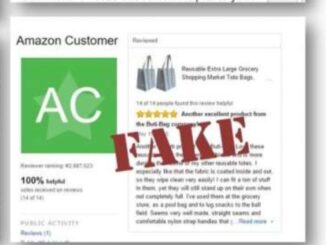
Bruxelles, 21 gennaio 2022 – La Commissione europea e le autorità nazionali per la protezione dei consumatori hanno pubblicato i risultati di uno screening (“sweep”) delle recensioni dei consumatori sui siti web.
Quasi due terzi dei negozi online, dei marketplace, dei siti web di prenotazione, dei motori di ricerca e dei siti di servizi di comparazione analizzati hanno suscitato dubbi sull’affidabilità delle recensioni: in 144 dei 223 siti web controllati, le autorità non hanno potuto confermare che gli operatori facciano abbastanza per assicurarsi che le recensioni siano autentiche, ossia pubblicate da consumatori che hanno effettivamente utilizzato il prodotto o il servizio recensito.
Le autorità per la protezione dei consumatori hanno concluso che almeno il 55% dei siti web controllati viola potenzialmente la direttiva sulle pratiche commerciali sleali, che richiede che ai consumatori siano presentate informazioni veritiere per consentire una scelta informata.
………..
https://consentcdn.cookiebot.com/sdk/bc-v3.min.htmlProtezione dei consumatori da recensioni ingannevoli: il 55% dei siti web sottoposti a screening viola il diritto dell’UEDaCOMM-REP-MIL-PRESS@ec.europa.euADatavenerdì 21 gennaio 2022 – 10:11
La Commissione europea e le autorità nazionali per la protezione dei consumatori hanno pubblicato i risultati di uno screening (“sweep”) delle recensioni dei consumatori sui siti web.
Quasi due terzi dei negozi online, dei marketplace, dei siti web di prenotazione, dei motori di ricerca e dei siti di servizi di comparazione analizzati hanno suscitato dubbi sull’affidabilità delle recensioni: in 144 dei 223 siti web controllati, le autorità non hanno potuto confermare che gli operatori facciano abbastanza per assicurarsi che le recensioni siano autentiche, ossia pubblicate da consumatori che hanno effettivamente utilizzato il prodotto o il servizio recensito.
Le autorità per la protezione dei consumatori hanno concluso che almeno il 55% dei siti web controllati viola potenzialmente la direttiva sulle pratiche commerciali sleali, che richiede che ai consumatori siano presentate informazioni veritiere per consentire una scelta informata.
La Commissione continuerà a collaborare con la rete Cooperazione per la protezione dei consumatori su questa importante questione e sosterrà le autorità nazionali nelle loro azioni di contrasto.
Protecting consumers from misleading reviews: 55% of screened websites violate EU law
Today, the European Commission and national consumer protection authorities released the results of an EU-wide website screening (“sweep”) on online consumer reviews. Under the coordination of the Commission, authorities of 26 Member States, Iceland and Norway checked 223 major websites for misleading consumer reviews. Almost two thirds of the online shops, marketplaces, booking websites, search engines and comparison service sites analysed, triggered doubts about the reliability of the reviews: In 144 out of the 223 websites checked, authorities could not confirm that these traders were doing enough to ensure that reviews are authentic, i. e. that they were posted by consumers that actually used the product or service that they reviewed.
Commissioner for Justice, Didier Reynders, said: “Consumers very often rely on online reviews when shopping or booking online. I don’t want consumers to be tricked. I want them to be able to interact in a trustworthy environment. I insist on one specific point: online businesses must provide consumers with clear and visible information on the reliability of such reviews. Today’s results are a clear call for action. We will ensure EU law is respected”.
Other findings of the screening of websites on online reviews:
· 104 out of the 223 of the websites examined do not inform consumers how reviews are collected and processed. Only 84 websites make such information accessible to consumers on the review page itself, while the rest mention it in “small print”, for example in their legal terms and conditions.
· 118 websites did not contain information about how fake reviews are prevented. In these cases consumers have no possibility to verify whether reviews were written by consumers that actually used the product or service.
· 176 of the websites do not mention that incentivised reviews (e.g. resulting from a monetary reward) are prohibited by their internal policies or if not how they ensure they are flagged as incentivised.
Consumer protection authorities concluded that at least 55% of the checked websites potentially violate the Unfair Commercial Practices Directive which requires that truthful information is presented to consumers to allow an informed choice. Authorities also had doubts for a remaining 18%.
Next steps
The national authorities will contact the traders concerned to rectify their websites and, if necessary, initiate enforcement actions according to their national procedures. The Commission will continue working with the CPC Network on this important issue and support national authorities in their enforcement actions.
Background
The Consumer Protection Cooperation (CPC) is a network of authorities responsible for the enforcement of EU consumer protection laws. To tackle cross-border issues, their actions are coordinated at EU level. Sweeps are carried out by the network yearly using a set of common criteria prepared by the European Commission. Information on previous sweeps can be found here.
As shown in the Market Monitoring Survey 2020, consumers often rely on reviews when they make purchasing decisions. For example, 71% of consumers consider reviews as important when choosing holiday accommodation. Authorities decided in 2021 to carry out this sweep into misleading practices in relation to online reviews.
Misleading practices regarding consumer reviews are covered by the Unfair Commercial Practices Directive, particularly its articles 6 and 7.This legislation has been recently clarified by the Better Enforcement and Modernisation Directive (Directive (EU) 2019/2161), which will apply as of 28 May 2022. To make enforcement easier it is explicitly provided that selling, buying and submitting false consumer reviews in order to promote products is prohibited. Further, there is now a clear obligation to inform the consumers about the handling of reviews.
For more information
Consumer Protection Regulation – factsheet
Better Enforcement and Modernisation Directive (Directive (EU) 2019/2161)





